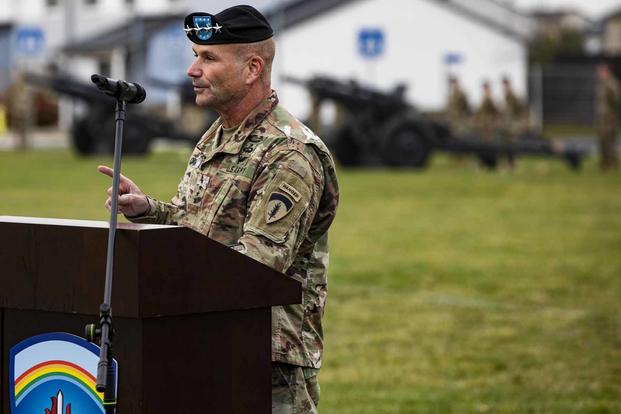A new commander for U.S. military and NATO forces in Europe is cruising toward an easy confirmation by the Senate amid U.S. efforts to support Ukraine's war against Russian invaders.
At a Senate Armed Services Committee hearing Thursday to consider Gen. Christopher Cavoli's nomination to be the next head of U.S. European Command and NATO's supreme allied commander, senators from both parties lined up to praise his record as exactly what's needed during Europe's largest ground war since World War II.
"I would say you are [Russian President] Vladimir Putin's worst nightmare and couldn't be more qualified than probably any other member of the military," Sen. Dan Sullivan, R-Alaska, said after asking Cavoli to "brag a little bit" about his record on Russia.
Read Next: Senator Wants DoD Climate Change Goals Locked into Law
"I think you've demonstrated quite clearly why you should be confirmed," added committee Chairman Jack Reed, D-R.I., as he wrapped up the hearing.
Cavoli right now serves as the commanding general of U.S. Army Europe and Africa, a position he's held since October 2020.
His resume also includes focusing on Russia in the foreign area officer program, serving as Russia director on the Joint Staff and getting a master's degree from Yale University in Russian and Eastern European studies.
If confirmed, Cavoli would succeed Gen. Tod Wolters, who has been at the helm of U.S. European Command since May 2019.
Cavoli would take control of U.S. forces in Europe at a time when their number has swelled to more than 100,000 in response to Russia's three-month-old invasion of Ukraine.
In his dual hat as supreme allied commander, Cavoli would also lead NATO forces at a time when the alliance is managing ripple effects from the war in Ukraine. In particular, Sweden and Finland recently formally applied to join the alliance, spurred by fears they could be Russia's next target.
Cavoli told senators that Sweden and Finland's militaries would both bring "quite a bit of capability and capacity" to the alliance. Further, he said, with those two countries in the alliance, all but a few kilometers of Baltic Sea coastline would be NATO territory.
"Finland has a large army, well-equipped, very well-trained, very quickly expansible, exercised very frequently, and absolutely expert in defending the borderline that it's had with Russia," he said, also highlighting Finland's recent decision to buy F-35 Lightning II fighter jets. "Sweden's the same thing. A smaller army, but a very capable army and an army that's growing. ... Critically, they bring a navy in the Baltic Sea, which will be of enormous military significance to the alliance."
Fears have also grown of global famine as Russia blocks grain exports from leaving Ukraine's Black Sea ports.
Cavoli told senators that he's already seeing effects of the grain shortage in Africa in his current role.
"I was recently in Kenya, and there was a significant impact there already. We know that in other countries such as Tunisia, the prices have skyrocketed for basic foodstuffs," he said. "It's of great concern. In many cases, these are countries that don't need an additional challenge, and those additional challenges, we will have to help them with at some point."
He did not get into specifics on what U.S. forces could do to counter Russia's Black Sea presence, but said, "Clearly, the current events in the Black Sea region are going to require us to go back and make sure that we adjust everything for the result of this conflict."
Beyond the current crisis of the war in Ukraine, Cavoli would also have to manage the long-standing difficulties getting NATO countries to meet the goal of spending 2% of their gross domestic product on defense, a goal set in 2014 that eight of 30 countries were meeting as of 2021.
Several countries have announced plans to spend more on defense following Russia's invasion of Ukraine, but some Republican U.S. lawmakers, following former President Donald Trump's "America First" platform, continue to complain that Europe is not doing enough to defend itself.
Asked whether NATO's defense spending goal should be higher than 2% of GDP, Cavoli said he agrees that number should be a "floor, not a ceiling."
"I know all of the land forces chiefs in NATO. Each one of them has a list of requirements. The requirements would all take more than 2% of GDP," Cavoli said. "So I am an advocate of spending more than 2%."
-- Rebecca Kheel can be reached at rebecca.kheel@military.com. Follow her on Twitter @reporterkheel.
Related: US, Allies 'Intensifying' Effort to Arm Ukraine with New Types of Weapons, Austin Says











